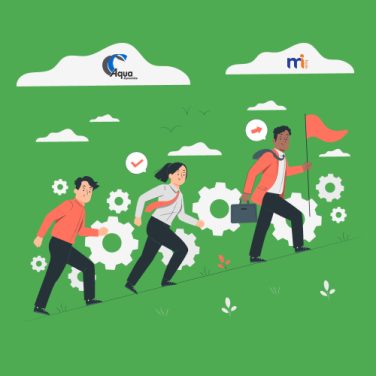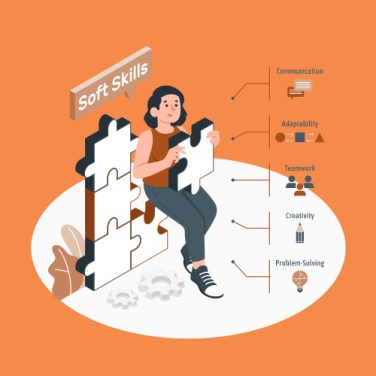Artificial Intelligence (AI) is not just a buzzword; it’s rapidly reshaping the landscape of Human Resources (HR).
As more companies recognise the potential of AI technology, its adoption within HR functions is accelerating. AI in HR aims to streamline operations, enhance recruitment processes, and make data-driven decisions more effectively.
AI’s influence extends beyond mere automation.
By leveraging AI, HR professionals can unlock valuable insights into workforce demographics, optimise talent acquisition, and improve employee engagement. This digital transformation is crucial for businesses looking to maintain a competitive edge in today’s fast-paced market.
Here, we delve into comprehensive case studies showing how AI is playing a pivotal role in evolving HR operations. Through real-world examples, we’ll explore its impact on recruiting efficiency, the challenges faced during AI adoption, and strategies for overcoming these hurdles.
Stay tuned as we uncover the transformative capabilities of AI in the realm of human resources.
How AI enhances recruitment efficiency

The advent of AI in recruiting processes has revolutionised how organisations identify and onboard talent. Leveraging AI tools, modern HR departments can significantly boost their efficiency by automating tedious tasks and providing data-driven insights.
Solutions such as those offered by MiHCM play a crucial role in creating a seamless recruitment process.
These tools facilitate everything from posting job vacancies to scheduling interviews and tracking applicants. The automation of these steps enables HR professionals to focus their attention on strategic decision-making and candidate engagement rather than administrative work.
- Reducing bias: One of the most significant advantages of AI in recruitment is its ability to reduce bias. By utilising AI algorithms to evaluate candidates based solely on skill and experience, organisations are better equipped to build diverse workforces without unconscious prejudices skewing their decisions.
- Enhancing efficiency: Efficiency in recruitment is further enhanced by AI through analytics that measure metrics such as the average time taken to hire and assessing the applicants-to-hire ratio. This empowers HR professionals to identify bottlenecks and make necessary adjustments to refine the process.
- Real-world success: Companies utilising AI-driven recruitment solutions often see substantial improvements in their hiring processes. By transforming traditional recruitment strategies into streamlined, intelligent systems, organisations can not only meet but exceed their hiring objectives efficiently.
Incorporating AI in recruitment is an indispensable step for any company aiming for long-term success.
The use of advanced AI analytics not only aids in a speedy hiring process but also provides a deeper understanding of potential employees, ensuring that the talent acquired aligns perfectly with organisational goals and culture.
This transformative power of AI positions it as a pivotal element in modern HR operations.
AI implementation in a real-world HR scenario
AI is not just transforming the theoretical framework of Human Resources but actively reshaping how businesses operate on a day-to-day basis. One compelling example of AI’s impact is evident in a case study involving a multinational corporation that integrated AI solutions into their HR operations.
The challenge:
- The corporation faced challenges in managing high recruitment volumes, which led to inefficiencies and delays.
- There was significant human bias during the candidate screening process, affecting diversity and inclusion goals.
- Lack of data-driven insights caused limitations in making strategic HR decisions.
The solution: Implementing AI-driven HR tools
To overcome these hurdles, the company deployed AI-driven solutions. These tools were integral in transforming their HR operations through scalable automation and real-time analytics, allowing for data-driven HR decisions.
- Enhanced recruitment process: By leveraging AI, the corporation automated repetitive tasks such as resume screening and candidate ranking, significantly reducing time-to-hire.
- Mitigating bias: The AI algorithms provided unbiased candidate evaluations, allowing HR to focus on skills and experience, thus fostering a more diverse and inclusive workforce.
- Predictive analytics: AI analytics furnished insights into workforce demographics, predicting turnover trends, and identifying potential leadership talent.
The outcome:
The implementation of AI solutions led to measurable improvements in HR efficiency and strategic decision-making. Here are the outcomes:
- Reduced recruitment time by 40%, facilitating faster business scale.
- Increased diversity among new hires by 30%, supporting inclusive company values.
- Gained actionable insights resulting in improved workforce management and operational decisions.
Leveraging AI in HR not only streamlines recruitment and improves employee engagement but also positions companies for long-term success, showcasing the profound influence of technological integration in human resources.
Revamping HR operations and processes
Artificial Intelligence has taken centre stage in revamping HR operations and processes, and its influence on efficiency enhancement cannot be overstated.
By harnessing the capabilities of AI-driven tools, businesses have managed to transform their HR departments into hubs of strategic decision-making and informed actions.
One of the prominent tools leading this transformation is MiHCM Data & AI, which empowers HR professionals by providing in-depth analytics and insights into various HR metrics, including workforce demographics and employee performance trends.
Such AI solutions facilitate data-driven decision-making, enabling HR teams to pre-emptively address workforce challenges and optimise operations.
Some of the key ways in which AI enhances HR efficiency include:
- Streamlined operations: AI tools automate routine tasks such as attendance tracking and leave management, freeing up HR professionals to focus on high-impact activities. This continuous automation leads to a more efficient workflow and improved resource allocation.
- Data-driven insights: With AI analytics, businesses can gain a granular understanding of workforce dynamics, helping them predict turnover trends and make strategic hiring decisions. This proactive approach is crucial for maintaining a competitive edge in talent acquisition and management.
- Improved employee engagement: AI provides insights that enable personalised engagement strategies tailored to individual employee needs, enhancing job satisfaction and reducing turnover.
- Compliance management: Automation through AI ensures adherence to local labour laws by maintaining accurate records and audit trails, which are critical for regulatory compliance and effective risk management.
Navigating AI adoption in HR

The incorporation of AI in HR brings transformative potential. Nevertheless, it’s not without its challenges. Enterprises embarking on this journey must carefully navigate the terrain to harness the full benefits of AI.
Common challenges include the integration of AI technologies with existing HR systems, data privacy concerns, and the need for upskilling the existing HR workforce to manage and interpret AI-generated data effectively.
Organisations often grapple with aligning AI solutions with their current infrastructure. This alignment is crucial to avoid disruptions and maximise AI capabilities.
Furthermore, privacy concerns arise as AI processes large amounts of employee data. It’s vital for companies to ensure robust data security measures and compliance with local labour laws.
Successful AI adoption in HR requires strategic planning and a collaborative approach. Here are some strategies to overcome common obstacles:
- Engage cross-functional teams to bridge gaps between IT and HR departments, ensuring smooth integration and alignment.
- Invest in training programmes to equip HR professionals with the skills necessary to leverage AI tools effectively.
- Implement transparent data policies to address privacy concerns, fostering trust among employees.
Despite these challenges, AI’s transformative power in enhancing HR operations is undeniable. It streamlines tasks, provides deep insights into workforce analytics, and enhances decision-making processes.
While challenges exist, the potential for improved recruitment efficiency and strategic management makes AI an invaluable asset in the HR sector.



